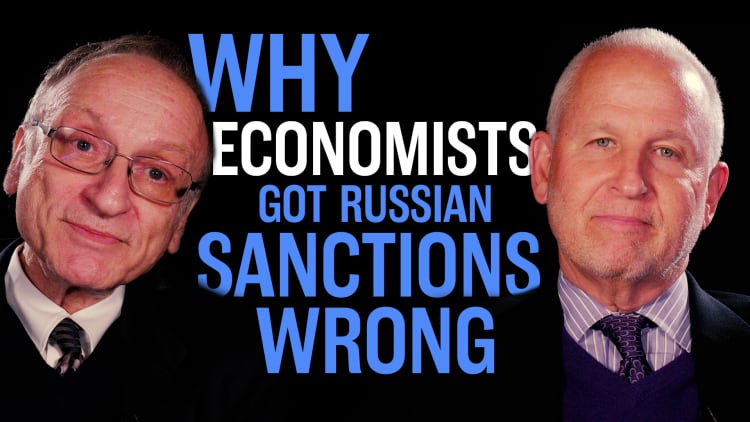What would happen if economists stopped listening to each other and instead started taking lessons from Anna Karenina?
That's what Morton Schapiro, president of Northwestern University, and Gary Saul Morson, professor of arts and humanities at Northwestern, believe economists need to do.
"We think that economics can learn a lot if it broadened its perspective so that economists drew on disciplines other than economics itself, particularly those that deal with culture and specifically with great literature," Morson told CNBC.
"While economics is a really important and robust discipline, if we had a little humility and a little less hubris we can improve the field dramatically," Schapiro added.
Together, the professors want economists to realize the importance of culture in making economic predictions or decisions.
"Economists have had this idea that they have a hard science modeled on Newtonian physics and just as physicists don't need to read novels, so we economists don't need to read novels, they think," Morson said.
"But, in fact, it's not a hard science that way. It [economics] has a lot to teach us but it needs a bit more humility and to learn from what great literature has to teach you."
Morson and Schapiro highlight real economic dilemmas that could have been resolved with better cultural understanding in their book "Cents and Sensibility."
Sanctions against Russia in 2014, for its actions in Crimea, are an example of nonsensical economic decision-making for Morson.
Although economists didn't predict Putin's reciprocal reaction to the sanctions, they would have if they understood more about Russian culture, he said.
"What Putin did was, he doubled. 'You put sanctions on us, we're going to put even more sanctions, you are going to restrict imports, and we'll restrict them even more.' It doesn't make any sense from a standard economic model.
"But Russians tend to think that the individuals exist for the glory of the state and people live and die but Russia continues. And that's what really matters.
"If you read a lot of Russian literature, you would see that sense of national spirit, which doesn't fit an economic model, is not how Americans or Englishmen would behave, but it does make perfect sense from a Russian perspective."
In "Cents and Sensibility," Morson and Schapiro use a famous 1991 World Bank memo to highlight just how wrong economists can get it.
"The memo simply said that you should take the waste that accumulates in Western Europe, in East Asia and North America and send it to a place where people are dying on average in the 50s, not in the 70s, and have very little education," Schapiro said.
"The problem with that approach is it shows the, I would say, the moral bankruptcy, and almost the lunacy, of the field of economics."
Morson said: "It's the sort of insanity you get when you think only in terms of your own discipline and don't imagine other considerations, whether ethical or even how it's going to sound to people on the outside."
Describing the "moral responsibility" of economists to get their predictions and solutions right, Schapiro said economists "can't just apply a set of simple economics principles" to any country.
"If we understood the politics, and we understood the history, and we understood the differences in religion, if we read the literature, for example, then maybe we could have insight into how people are going to respond differentially," he said.
"Since their [economists'] aim is to better human life, take into account ideas of justice and ethics that really are pertinent, but which economics by itself is not equipped to handle," Morson added.






